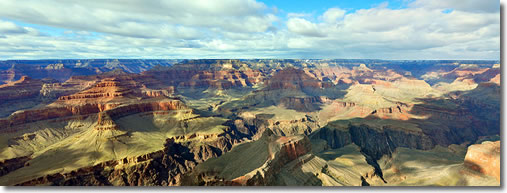The Power of Field Studies
by Kristine Gilbert
Instructor, Environmental Studies and Sustainability Dept., Sierra College
I often feel like I must be one of the luckiest people on earth. These feelings come most powerfully when I am teaching a field course for Sierra College. Over the last five years, I have been lucky enough to introduce more than one hundred students to a multitude of ecosystems in California, Arizona, and Nevada. We have taken day-hikes into the Grand Canyon that, as described by the National Park Service, “pass through every ecosystem to be found between Canada and Mexico.”

We have seen thousand year old Redwood trees that tower hundreds of feet above us, juxtaposed just a mile away by pygmy forest that contain soil that is so water-logged and acidic that pine trees can’t grow more than a few feet tall in a hundred years. We have witnessed the migration of marine mammals, the reproduction of banana slugs, and the power that biological data can have in protecting threatened ecosystems. We have met with experts in marine science, aquatic toxicology, fisheries biology, and climate science, to name a few, and we have been given private tours of lab facilities and outdoor research projects.
“I learned so much"
Students who take field courses at Sierra College tell me, time and time again, that they learned so much more than they expected to. Here is one example of the types of comments that I receive from field classes:
“I learned so much this weekend, and now have a new-found interest in the different types of wildlife and ecosystems. This has stimulated an interest in me, with the mindset of- what more can I do to help preserve them? … Learning in the field is hands on and quite necessary for us kinesthetic learners … You bring to the table a breadth of knowledge in so many areas, it is very apparent that you love what you do! … I hope that Sierra College continues to have the field trips, this hands on knowledge from instructors like you is invaluable!”
—Charmaine Devoure, May 2011
While feedback like this is frequent, as an instructor I see the power of the field classes manifest in so many ways. I can hear it in the students’ voices as they explore the desert at night, looking for scorpions to fluoresce under a black light. I can see it in their body language as they bounce up and down in excitement from seeing their first ever whale, and wonder at the secrets that must be below the ocean waves. And I can actually watch students grow in maturity and respect for nature over the course of a field class.
My introduction to field courses
It was through my own exposure to field courses and field research as an undergraduate at UC Davis that I really gained a grasp of and appreciation for the ecosystem processes that support all life on this planet. While I wholeheartedly believe that traditional classroom education is of utmost importance, there is no amount of classroom time that can replace the magical teaching moments that occur in the field.
I remember one particularly powerful conversation I had with a former Sierra College student. He saw me walking through the library one afternoon, and hurried over to catch me before I walked out of the building. He thanked me for a field course that he had taken with me more than one year prior. He was a Administration of Justice major, and admitted to me that he had no desire to take that particular field course, having neither an interest in biology nor an affection towards the outdoors, but that his father had talked him in to it. That afternoon, the student shared with me that the one-week Sierra College field biology course changed his life. He proceeded to spend the next ten minutes telling me how much he got out of that week, from an appreciation of biological diversity to a sense of place on and responsibility and gratitude toward this planet. This is something that this gentleman will carry with him for the rest of his life.

And this is the power and importance of field biology. Whether a student is going into the sciences or not, they will be living on this planet, and if they are going to do so consciously, they must have an understanding of ecological principles.
Budget cuts
The current budget situation at Sierra College and in the State of California puts educators in a tough place. We have been forced to take cuts to the bone, and field studies are experiencing an ebb tide. But like the intertidal organisms that we study on field classes, we are resilient, and we will weather the storm. The faculty who are dedicated to field studies will continue exposing as many students as we can to the hands-on experience of field studies. I am looking forward to when the tide changes, and the field program at Sierra College can experience a flood of course offerings. The student and faculty interest is certainly there!
